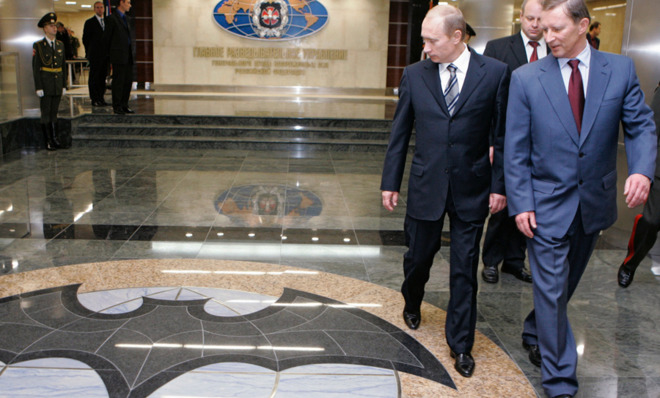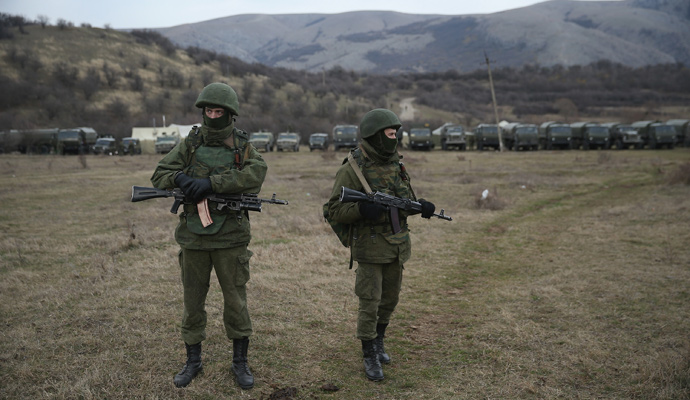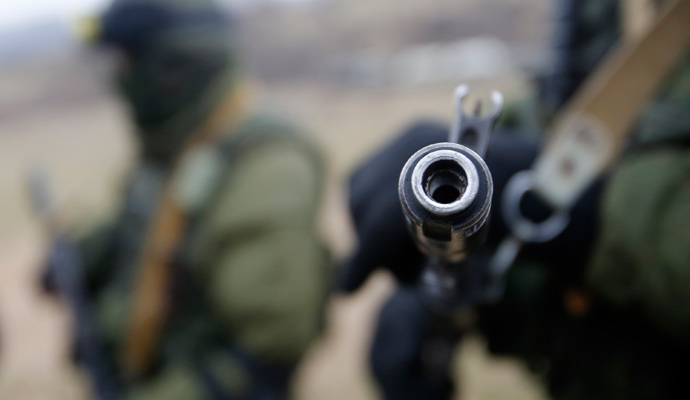This spy agency is Putin's secret weapon
Meet GRU, the intelligence apparatus enforcing Moscow's will in Ukraine

A free daily email with the biggest news stories of the day – and the best features from TheWeek.com
You are now subscribed
Your newsletter sign-up was successful

There are two ways an espionage agency can prove its worth to the government it serves. Either it can be truly useful (think: locating a most-wanted terrorist), or it can engender fear, dislike, and vilification from its rivals (think: being named a major threat in congressional testimony). But when a spy agency does both, its worth is beyond question.
Since the Ukraine crisis began, the Kremlin has few doubts about the importance of the GRU, Russia's military intelligence apparatus. The agency has not only demonstrated how the Kremlin can employ it as an important foreign-policy tool, by ripping a country apart with just a handful of agents and a lot of guns. The GRU has also shown the rest of the world how Russia expects to fight its future wars: with a mix of stealth, deniability, subversion, and surgical violence. Even as GRU-backed rebel groups in eastern Ukraine lose ground in the face of Kiev's advancing forces, the geopolitical landscape has changed. The GRU is back in the global spook game and with a new playbook that will be a challenge for the West for years to come.
Recent years had not been kind to the Main Intelligence Directorate of the General Staff, the Glavnoe razvedyvatelnoe upravlenie (GRU). Once, it had been arguably Russia's largest intelligence agency, with self-contained stations — known as "residencies" — in embassies around the world, extensive networks of undercover agents, and nine brigades of special forces known as Spetsnaz.
The Week
Escape your echo chamber. Get the facts behind the news, plus analysis from multiple perspectives.

Sign up for The Week's Free Newsletters
From our morning news briefing to a weekly Good News Newsletter, get the best of The Week delivered directly to your inbox.
From our morning news briefing to a weekly Good News Newsletter, get the best of The Week delivered directly to your inbox.
By the start of 2013, the GRU was on the ropes. Since 1992, the agency had been in charge of operations in the post-Soviet countries, Russia's "near abroad." But Russian President Vladimir Putin appears to have seen it as increasingly unfit for that purpose. When the Federal Security Service (FSB), Russia's domestic security agency, was allowed to run operations abroad openly in 2003, one insider told me that this was because "the GRU doesn't seem to know how to do anything in our neighborhood except count tanks." (It may not even have done that very well. Putin regarded the GRU as partly responsible for Russia's lackluster performance in the 2008 invasion of Georgia.) There was a prevailing view in Moscow that the GRU's focus on gung-ho "kinetic operations" like paramilitary hit squads seemed less relevant in an age of cyberwar and oil politics.
(More from Foreign Policy: How Microsoft perfectly predicted the World Cup's final stage)
Political missteps also contributed to the GRU's diminished role. Valentin Korabelnikov, the agency's chief from 1997 to 2009, seemed more comfortable accompanying Spetsnaz assassination teams in Chechnya than playing palace politics in Moscow. His criticisms of Putin's military reforms put him on the Kremlin's bad side too. Korabelnikov was sacked in 2009 and replaced with soon-to-be-retired Col. Gen. Alexander Shlyakhturov, who, within two years, was rarely seen in the GRU's headquarters due to his bad health. In December 2011 the GRU welcomed its third head in nearly three years, Maj. Gen. Igor Sergun, a former attaché and intelligence officer with no combat experience and the lowest-ranking head of the service in decades. By the end of 2013, the Kremlin seemed to be entertaining the suggestion that the agency be demoted from a "main directorate" to a mere directorate, which would have been a massive blow to the service's prestige and political access.
In many ways, a demotion for the GRU seemed inevitable. Since 2008, the GRU had suffered a savage round of cuts during a period when most of Russia's security and intelligence agencies' budgets enjoyed steady increases. Eighty of its hundred general-rank officers had been sacked, retired, or transferred. Most of the Spetsnaz were reassigned to the regular army. Residencies were downsized, sometimes even to a single officer working undercover as a military attaché.
A free daily email with the biggest news stories of the day – and the best features from TheWeek.com
What a difference a few months can make. What the Kremlin had once seen as the GRU's limitations — a focus on the "near abroad," a concentration onviolence over subtlety, a more swashbuckling style (including a willingness to conduct assassinations abroad) — have become assets.
The near-bloodless seizure of Crimea in March was based on plans drawn up by the General Staff's Main Operations Directorate that relied heavily on GRU intelligence. The GRU had comprehensively surveyed the region, was watching Ukrainian forces based there, and was listening to their communications. The GRU didn't only provide cover for the "little green men" who moved so quickly to seize strategic points on the peninsula before revealing themselves to be Russian troops. Many of those operatives were current or former GRU Spetsnaz.

There is an increasing body of evidence that the so-called defense minister of the separatist Donetsk People's Republic, Igor Strelkov, whose real name is Igor Girkin, is a serving or reserve GRU officer, who likely takes at the very least guidance, if not orders, from the agency's headquarters. As a result, the European Union has identified him as GRU "staff" and has placed him on its sanctions list. Although the bulk of the insurgents in eastern Ukraine appear to be Ukrainians or Russian "war tourists" — encouraged, armed, and facilitated by Moscow — there also appear to be GRU operators on the groundhelping to bring guns and people across the border.
It was only when the Vostok Battalion appeared in eastern Ukraine at the end of May that the GRU's full re-emergence became clear. This separatist group bears the same name as a GRU-sponsored Chechen unit that was disbanded in 2008. This new brigade — composed largely of the same fighters from Chechnya — seemed to spring from nowhere, uniformly armed and mounted in armored personnel carriers. Its first act was to seize the administration buildingin Donetsk, turfing out the motley insurgents who had made it their headquarters. Having established its credentials as the biggest dog in the pack, Vostok began recruiting Ukrainian volunteers to make up for Chechens who quietly drifted home.
(More from Foreign Policy: Responsibility to protect the bad guys)
Alexander Khodakovsky, a defector from the Security Service of Ukraine, subsequently announced that he was the battalion's commander. But this only happened a few days after the seizure of the Donetsk headquarters. The implication is that the battalion was originally commanded by GRU representatives. Vostok appears intended not so much to fight the regular Ukrainian forces — though it has — but rather to serve as a skilled and disciplined enforcer of Moscow's authority over the militias if need be.
The Vostok Battalion makes Moscow's strategy clear: The Kremlin has no desire for outright military conflict in its neighbors. Instead, the kind of "non-linear war" being waged in Ukraine, which blends outright force, misinformation, political and economic pressure, and covert operations, will likely be its means of choice in the future. These are the kinds of operations in which the GRU excels.
After all, while Moscow is not going to abandon its claims to being a global power, in the immediate future Russia's foreign-policy focus will clearly be building and maintaining its hegemony in Eurasia. These are also the areas where the GRU is strongest. For example, in Kazakhstan, whose Russian-heavy northern regions are a potential future target for similar political pressure through local minorities, the GRU is the lead intelligence provider, as its civilian counterpart, the SVR, is technically barred from operating in Kazakhstan or any of the countries in the Commonwealth of Independent States by the 1992 Alma-Ata Declaration.
The combination of these factors means that the GRU now looks far more comfortable and confident than it did a year ago. Kiev outed and expelled a naval attaché from the Russian Embassy as a GRU officer, and Sergun, the GRU's head, made it onto the list of officials under Western sanctions. But neither of these actions has done the agency any harm. If anything, they have increased the GRU's prestige.

Talk of downgrading the GRU's status is conspicuously absent in Moscow circles. The agency's restored status means it is again a player in the perennial turf wars within the Russian intelligence community. More importantly, it means that GRU operations elsewhere in the world are likely to be expanded again and to regain some of their old aggression.
The GRU's revival also demonstrates that the doctrine of "non-linear war" is not just an ad hoc response to the particularities of Ukraine. This is how Moscow plans to drive forward its interests in today's world. The rest of the world has not realized this now, even though Chief of the General Staff Valery Gerasimov spelled it out in an obscure Russian military journal last year. He wrote that the new way of war involves "the broad use of political, economic, informational, humanitarian, and other nonmilitary measures … supplemented by military means of a covert nature character," not least with the use of special forces.
(More from Foreign Policy: 'It's like jail here')
This kind of conflict will be fought by spies, commandos, hackers, dupes, and mercenaries — exactly the kind of operatives at the GRU's disposal. Even after the transfer of most Spetsnaz out of the GRU's direct chain of command, the agency still commands elite special forces trained for assassination, sabotage, and misdirection, as Ukraine shows. The GRU has also demonstrated a willingness to work with a wide range of mavericks. In Chechnya, it raised not just the Vostok Battalion but other units of defectors from guerrillas and bandits. The convicted arms dealer Viktor Bout is generally accepted to have been a part-time GRU asset too. The GRU is less picky than most intelligence agencies about who is cooperates with, which also means that it is harder to be sure who is working for them.
NATO and the West still have no effective response to this development. NATO, a military alliance built to respond to direct and overt aggression, has already found itself at a loss on how to deal with virtual attacks, such as the 2007 cyberattack on Estonia. The revival of the GRU's fortunes promises a future in which the Cold War threat of tanks spilling across the border is replaced by a new kind of war, combining subterfuge, careful cultivation of local allies, and covert Spetsnaz strikes to achieve the Kremlin's political aims. NATO may be stronger in strictly military terms, but if Russia can open political divisions in the West, carry out deniable operations using third-party combatants, and target strategic individuals and facilities, it doesn't really matter who has more tanks and better fighter jets. This is exactly what the GRU is tooling up to do.
-
 Political cartoons for February 16
Political cartoons for February 16Cartoons Monday’s political cartoons include President's Day, a valentine from the Epstein files, and more
-
 Regent Hong Kong: a tranquil haven with a prime waterfront spot
Regent Hong Kong: a tranquil haven with a prime waterfront spotThe Week Recommends The trendy hotel recently underwent an extensive two-year revamp
-
 The problem with diagnosing profound autism
The problem with diagnosing profound autismThe Explainer Experts are reconsidering the idea of autism as a spectrum, which could impact diagnoses and policy making for the condition